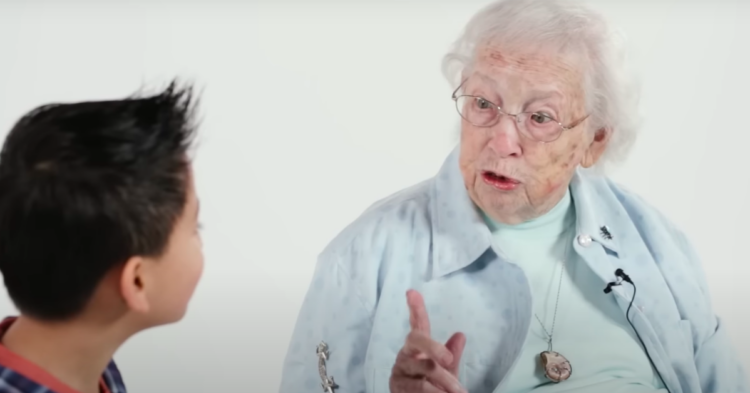Grandparenting is all about making special memories with your baby’s baby. But sometimes, even with the best intentions, certain comments can land the wrong way, especially today. To keep your relationship with your grandkids as awesome as possible, here are some tips for steering clear of common pitfalls and keeping the vibes positive.
First up, ditch “Don’t tell your parents”
Embed from Getty ImagesWhile sneaking an extra cookie might seem harmless, Dr. Zainab Delawalla warned that it can undermine parental authority and create confusion, according to HuffPost, per Buzzfeed. “It undercuts parental authority, which can have long-standing consequences,” she said. Instead, focus on fun activities that everyone can enjoy together, respecting the boundaries set by parents.
Clinical psychologist Ryan Howes told HuffPost that we should also stop telling children they’re “spoiled.”
Embed from Getty Images“If they are acting entitled and ungrateful, this may be a behavior they learned or saw modeled for them,” he said. Instead of judging, offer patience and understanding, and maybe try to discuss any concerns with the parents privately.
Forcing physical affection can also be a misstep. Dr. Dorn suggested that insisting on hugs or kisses might pressure kids and confuse them about personal boundaries.
Embed from Getty ImagesSo you might want to opt out of saying things like, “Where’s my hug/kiss?”
“While this phrase is likely filled with love, it can also unintentionally take away a child’s right to autonomy,” Dr. Dorn explained.
Embed from Getty ImagesTry asking if they’re comfortable with a hug and accept their response gracefully. Respecting their boundaries shows that you value their comfort and personal space.
“This can send confusing messages about consent,” Dorn added.
Next, you may want to avoid commenting negatively about how their parents are raising them, like “Your parents are wrong about…”
Embed from Getty ImagesDr. Howes warned that criticizing parenting styles can come off as shaming. “If grandparents have a beef with how their child is parenting, they should bring it up to them or keep it to themselves, but leave the grandchildren out of it,” Howes said.
Criticizing or shaming children for being too “sensitive” can also be harmful.
Embed from Getty ImagesInstead, be a supportive listener and show empathy. Your grandkids need to feel heard, especially when they’re dealing with strong emotions. Acknowledge their feelings without dismissing them. Encouraging children to bottle their emotions is unhealthy for obvious reasons!
Rather than commenting on their physical traits by saying things like, “You’ve gotten so big,” focus on asking about their hobbies or interests.
Embed from Getty Images“The issue with comments about physical appearance or comparisons to others is that they place an increased focus on the importance of external features over internal traits,” Dorn told HuffPost.
Food talk is another area to approach with caution.
Embed from Getty ImagesDr. Andrea Dorn advised against making comments like “You ate more than I did!” which can influence how children perceive food and their eating habits. “Comments about ‘good’ and ‘bad’ eating habits can influence children to adjust their eating behavior in reaction to another person’s comments,” she explained.
Instead, model healthy eating habits by listening to your body’s signals and focusing on the joy of sharing a meal.
Embed from Getty ImagesYou wouldn’t want to accidentally impact their relationship with food forever now, would you?
Along the same theme, you should refrain from using terms of endearment that refer to the child’s weight.
Embed from Getty ImagesThis can include words like “chubby” or “couch potato.” Even if you mean well by it, remarks like this can cause self-consciousness at an early age. Instead, focus on positive self-talk and healthy language around body image.
You should avoid showing favoritism among grandchildren by saying things like, “You’re my favourite grandchild” or “I wish your sibling was more like you.”
Embed from Getty ImagesSpeaking to GoodToKnow, clinical psychologist Dr. Daniel Glazer revealed that this can cause resentment between siblings and a toxic competitive nature.
“The truth is, grandparents wield significant influence over young developing minds. Their approval, validation and respect for boundaries help shape self-worth, confidence and values,” Dr. Glazer detailed.
Embed from Getty Images“So, injudicious comments that might seem insignificant to adults can reverberate through children’s developmental lenses in distorting ways,” he added.
Shaming a child for their toys, interests, and hobbies is not recommended either. Avoid saying, “Only babies still play with dolls/trucks” or “Isn’t that a silly game?”
Embed from Getty ImagesComments like this can hurt a child’s confidence, cause embarrassment, and potentially cause them to sacrifice their own interests in the future for the sake of being accepted, socially.
By choosing your words wisely, you can nurture a strong, positive bond with your grandkids that lasts a lifetime and can positively impact their overall development.
Embed from Getty ImagesThe more you know!
Let us know what you think of these outdated phrases being phased out in modern parenting.
















































